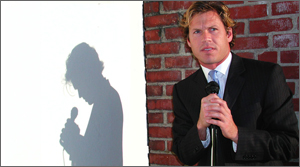Scientist Turned Comedian: Tim Lee
by
 Standing in front of a packed seminar room and sharing your ideas using Powerpoint is an important part of research. In that respect, Tim Lee is like any other scientist. Now, the fact that his seminars start at 10pm on Saturday nights and require a two-drink minimum- well, that’s a bit more unusual…
Standing in front of a packed seminar room and sharing your ideas using Powerpoint is an important part of research. In that respect, Tim Lee is like any other scientist. Now, the fact that his seminars start at 10pm on Saturday nights and require a two-drink minimum- well, that’s a bit more unusual…
Tim Lee, PhD (aka, The Powerpoint Comedian) took a chance on a less-than-conventional post-graduate track. What resulted is a hilarious stand-up comedy act in which he walks audiences through scientific concepts such as nuclear fission and the “super covalent bond” (the force that describes the force between his roommate’s body hair and a bar of soap). We spoke with Tim about the decision to leave science, the similarities between science and comedy and the scientific method in writing jokes.
.
BF: At what point in graduate school did you realize you weren’t happy at the bench?
TL: I loved my first three years of graduate school: Classes, teaching, access to high powered computers. It was like camp for nerds. I made a critical mistake when I agreed to a dissertation topic that I was not interested in. My adviser had funding and needed someone to do the research. Once I agreed to do it my life changed. I was now doing a crappy job that I wasn’t interested in for little pay. Most people are smart enough to sell their soul for a lot of money. I sold mine for bagels and coffee.
More awkward: bombing a joke or telling your PI and family you were leaving to become a stand-up comedian?
My family handled the stand-up transition surprisingly well. If my son, who had never set foot on stage before, came to me and told me he was going to be a comedian I would smack him a few times to see if he was awake. They said “do what makes you happy”. I thought they were trying to use reverse psychology on me or something.
A joke bombing is the same feeling as trying to pick up a woman and getting shot down. Since I have a lot of experience with that it wasn’t all that painful.
What’s been the most difficult part of the career transition to comedy?
I analyze my jokes and the audience response in a quantitative fashion. That’s an advantage I have coming from science into the arts. I can measure improvement whereas most artists rely solely on their gut. This enables me to spot weaknesses in my act and improve quickly where other artists could not. However the hard part for me was having *faith* that if I continued to improve… comedy would lead somewhere. There’s no axiom that states if you put together a good act people will come to watch.
 Who are your comedic influences?
Who are your comedic influences?
The list is long: a few of them are Steven Wright, Bill Cosby, Jerry Seinfeld, Steve Martin, Mark Twain and Gary Larson. Gary Larson cartoons often popped up during lectures when I was an undergrad. They were the first gag slides I remember seeing. He combined science and comedy beautifully. Steven Wright’s dry delivery and mastery of absurd logic are qualities I strive to emulate in my own act. Bill Cosby has been a big influence because he was one of the few comedians I could listen to with my dad in the car. He’s the reason I work clean.
What has been the response to your act from fellow comedians?
It’s been mostly very positive. I’ve had a number of big gigs come my way because other comedians recommended me. One comedian got me a gig where the audience was over seven thousand people. Of course, there are comedians who hate what I do. That’s part of being an artist you must accept: not everyone is going to like you. Bill Cosby said it best: “I don’t know the key to success, but the key to failure is trying to please everybody.”
What would be your dream show?
I’d perform at Carnegie Hall with Steven Wright, Bill Cosby, Jerry Seinfeld, Steve Martin for an audience of single women on Halloween. Preferably they’d be dressed up as French maids, nurses, and cats. The audience that is, not the comedians.
Scientific talks are notoriously dry – do you think there’s any room for bringing in humor and comedy into them? Or perhaps a two-drink minimum?
There’s plenty of room for humor. I don’t recommend a two-drink minimum unless you have a bouncer. I learned that lesson the hard way.
Is there any scientific method in writing jokes?
I analyze why things are funny all the time. That analysis helps me with my own writing. If I can figure out why something is funny it has a much better chance of working on stage.
Aside from learning Powerpoint, would you say your PhD has helped you as a comedian in any other ways?
It was the perfect preparation. I used to give talks in front of smart people who would pick apart my logic. Now I give talks in front of drunk people who try to pick apart my jokes. The drunken audience is easier to please but more violent when disappointed.
Most comedians are highly analytical of the world around them – almost scientific… Do you see similarities in the two careers?
Yes, both people are curious about why the world is the way it is. Scientists figure out. Comedians lash out.
What would you say to grad students or postdocs who are unsure of their career path and are looking for other options?
The world is open to you. It’s hard to remember that at times but it’s true. If you have a good mind you can retrain it to do anything.
What’s the easiest way for us to keep up with your comedy?
Come see a show sometime. All the info is on my website: powerpointcomedian.com
_____________________________________________________________________
Tim wasn’t supposed to be a comedian. A biologist by training, he graduated magna cum laude from UC San Diego with honors in biology. He went on to complete his PhD at UC Davis. He spent years developing simulation and analytical models of population dynamics before he discovered that this bored him to tears. When he tried comedy for the first time the tears stopped. Lee’s comedy uses scientific phenomena and tools to explain everything from the hair that collects on a bar of soap to how his standards drop rapidly with abstinence.
.


PlayLady
wrote on January 27, 2010 at 1:03 pm
I knew artists and scientists had a lot common.
Love this!! It's confirmation that if we don't like where we are or what we're doing, then we have the power to change it. Can't wait to see Tim live!
wizkid
wrote on January 27, 2010 at 6:51 pm
Glad to see Carrot Top is not one of his influences. Otherwise, two years from now he'd be on steroids, getting plastic surgery and wearing make-up…
kfly
wrote on January 28, 2010 at 4:05 pm
Hey Tim – still would love to hear what your PI said when you told him/her you were leaving to pursue comedy!!
Tim Lee
wrote on February 1, 2010 at 9:41 pm
@kfly I'd answer but I'm a strong believer in "If you can't say anything nice … " :)
kfly
wrote on February 3, 2010 at 9:41 pm
Haha! No worries then, mate! Cheers to you and good luck. Your stuff is brilliant so far!
Tim Lee Tickets: Enter Our Fan Appreciation Giveaway! | BenchFly Blog
wrote on June 8, 2010 at 5:57 am
[…] tickets to his upcoming show in Boston on July 9th. If you’re new to his work, check out our interview with Tim Lee and a sample of his […]
Career-related from Grad School to Job | BenchFly Blog
wrote on December 2, 2010 at 4:53 pm
[…] Scientist Turned Comedian: Tim Lee – sometimes experimental results feel like someone is playing a joke on us- maybe it’s time to start telling some […]
Stan
wrote on February 24, 2011 at 6:48 am
A good man he is. And a good friend. Cheers Tim.